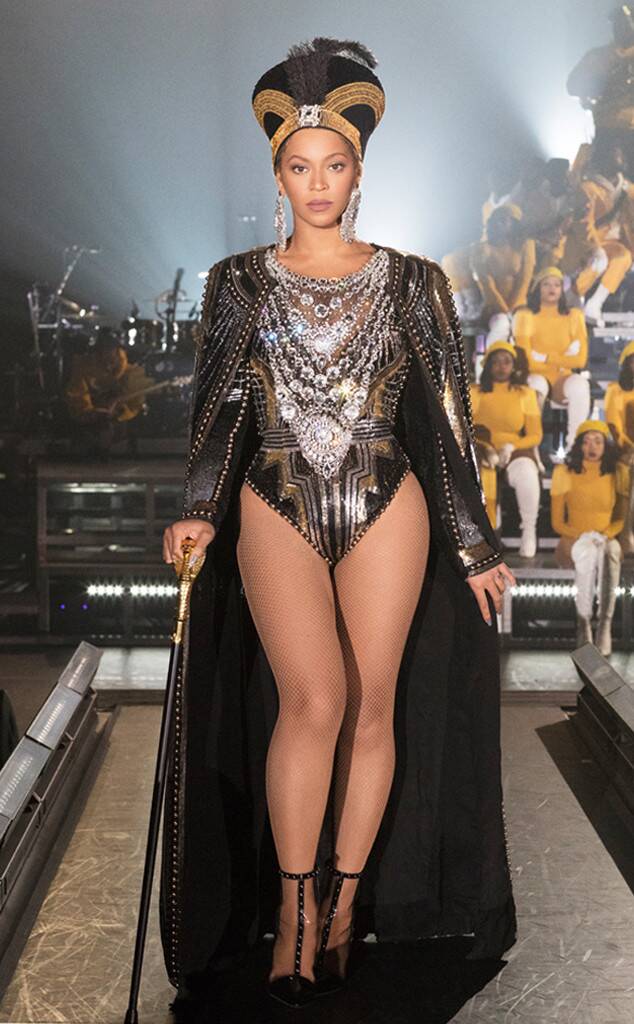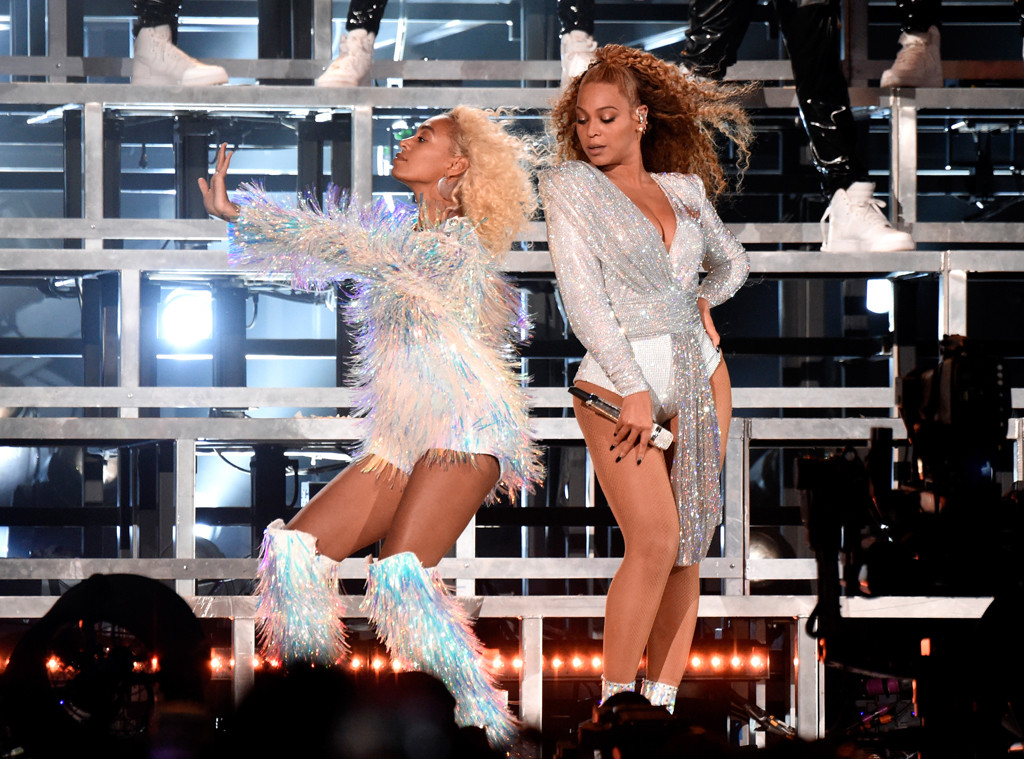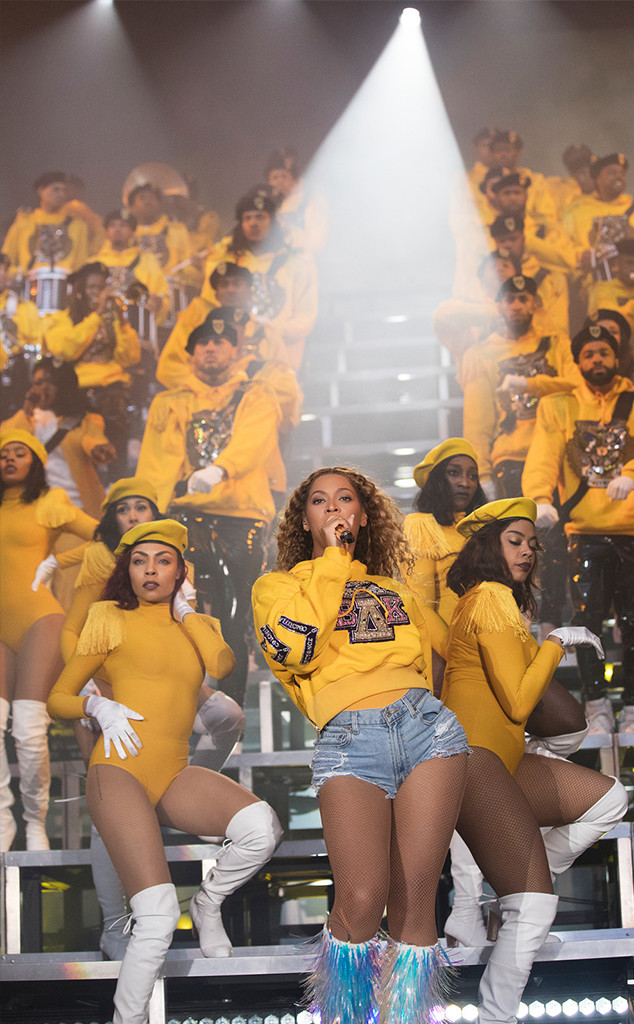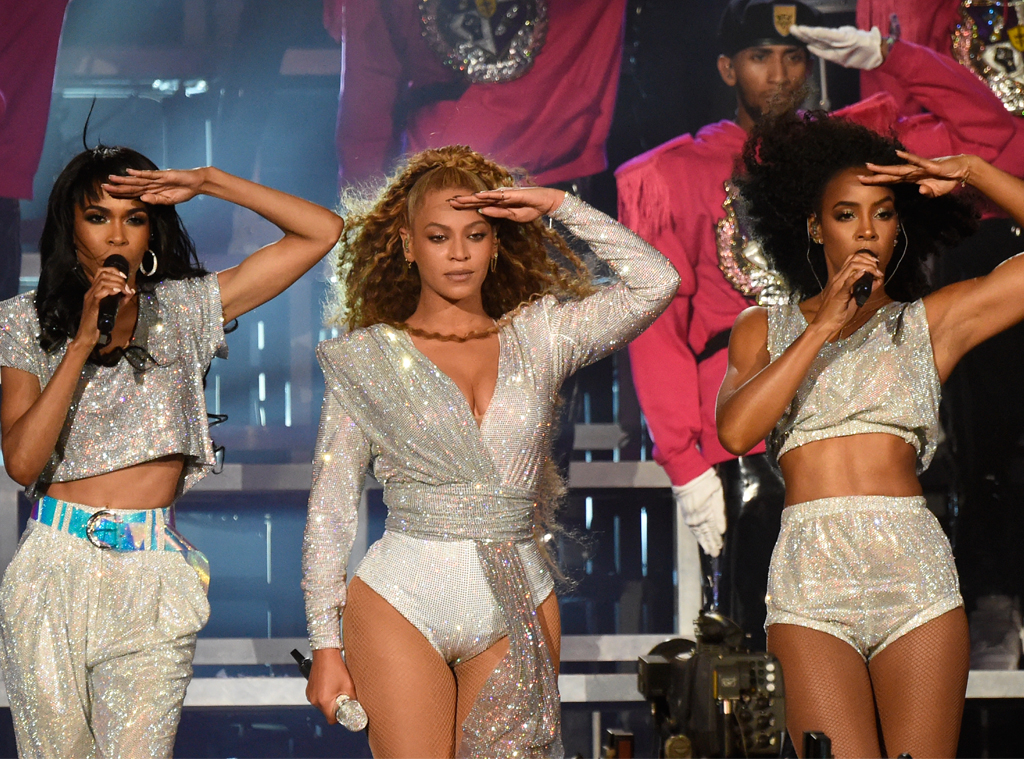Robin Harper

Making history is nothing new to Beyoncé.
While the list is endless, one of the Bey Hive’s most recent memory of their queen reigning supreme is her 2018 Coachella performance. She said it best herself that night, “Thank you for allowing me to be the first black woman to headline Coachella, ain’t that bout a b-tch?”
Aside from becoming the first Black woman to headline the music festival in its 20-year history, she also became the third woman to headline the festival. Ariana Grande became the fourth in 2019 and before that, Lady Gaga and Björk (who headlined twice) made the list.
Her highly anticipated set drew thousands of eager attendees who were buzzing with excitement and witnessed history as the Lemonade singer gave fans a Destiny’s Child reunion, a performance with husband Jay-Z and a badass reunion with her sister Solange.
And just like that, in a matter of two hours—and after a couple of iconic outfit changes—the 38-year-old singer would turn Coachella into #Beychella for years to come.
‘Cause let’s face it, no headliner can come close to the impeccable and unforgettable performance that Queen Bey put on that night.
So, if only from our couches this weekend, let’s relive how Beyoncé changed the festival—known for historically favoring predominantly white and male musical acts as their headliners—forever.
As she aptly stated in her 2019 Netflix documentary Homecoming, “It’s hard to believe that, after all these years, I was the first African American woman to headline Coachella.”
She added, “As a black woman, I used to feel like the world wanted me to stay in my little box and black women often feel underestimated. I wanted us to be proud of not only the show, but the process, proud of the struggle, thankful for the beauty that comes with a painful history and rejoice in the pain, rejoice in the imperfections and the wrongs that are so damn right. I wanted everyone to feel grateful for their curves, their sass, their honesty, thankful for their freedom. It was no rules and we were able to create a free, safe space where none of us were marginalized.”
Robin Harper
As fans at the 2018 festival witnessed, Beyoncé made sure to create that “safe space” by making the culture of historically black colleges and universities front and center.
From being accompanied onstage by over 200 performers that made up a black orchestra, steppers, vocalists and a marching band—the singer’s two-hour set was a celebration of their identities, culture and no one held back.
As her mother Tina Knowles also put it following her daughter’s historic performance, “I told Beyonce that I was afraid that the predominantly white audience at Coachella would be confused by all of the black culture and Black college culture because it was something that they might not get. Her brave response to me made me feel a bit selfish and ashamed. She said I have worked very hard to get to the point where I have a true voice and at this point in my life and my career, I have a responsibility to do whats best for the world and not what is most popular.”
Her close attention to symbolism also extended to her fashion choices on both weekends. For weekend one of the music festival, the “I Ain’t Sorry” singer and her stylist Marni Senofonte connected with fashion designer Oliver Rousteing of Balmain to bring her visions to life.
From the custom-made Nefertiti-inspired ensemble that she donned when she first took to the stage to the crests on the sweatshirts (Delta Kappa and BAK), it was all an homage to Black culture in this country. (Not to mention, she sampled Nina Simone and played back excerpts from a Malcolm X speech during his set.)
“When I decided to do Coachella, instead of me pulling out my flower crown, it was more important that I brought our culture to Coachella,” the Houston, Texas native added. “I wanted every person that has ever been dismissed because of the way they look to feel like they were on that stage.”
But her road to the Coachella stage wasn’t easy—even though an artist of her caliber make it look easy.

Kevin Mazur/Getty Images for Coachella
As fans may recall, the Lemonade artist was slated to perform at Coachella in 2017 but later announced she would be pulling out of the festival when she revealed she was pregnant with twins Sir and Rumi.
During her Netflix documentary, she shared her body went through more than she ever thought possible. So, following the birth of her twins, her 2018 performance would be her “first time back home,” adding that “there were days that I thought I’d never be the same.”
The singer feared that her strength and endurance as a performer would never be what it once was. In short, the road to her return back on stage called for her to “rebuild” her body. But beyond that, she also had to grapple with sacrifices as a mother.
“My body was not connected. My mind was not there,” she said about the internal conflict she was experiencing. “My mind wanted to be with my children. What people don’t see is the sacrifice.”
But at the end of weekend 2 of Coachella, those days, weeks and months of practicing everything to near perfection paid off. “I feel like I’m just a new woman in a new chapter of my life,” she shared in Homecoming. “I’m not even trying to be who I was.”
And while fans might have gotten a different taste of the artist when she released Lemonade in 2016, her Coachella historic performance was something else entirely.

Robin Harper
As soon as Queen Bey stepped out on stage, viewers at the Empire Polo Club fields and those streaming at home, knew we were about to witness something that only artists like her envision and execute.
As New Yorker writer Doreen St. Felix wrote of the singer’s performance, “No other living pop star is aware of her origin, or her truth that any origin is porous and multiple. In using snippets from Outkast, Juvenile, C-Murder, Pastor Troy, Big Freedia, and D.R.A.M. as transitions in her arrangements, Beyoncé presented herself as the inheritor of a suite of black styles.”
To mark the beginning of a legendary performance, Beyoncé gallantly strutted her way to the main-stage, ready to make her presence known. Then came the dance numbers, the marching band and all of the special tributes and appearances.
“Coachella, y’all ready?” the singer asked before jumping straight into a performance of “Crazy In Love.”
Of course, one of our favorite moments of her performance—besides her duet with Jay-Z of “Deja Vu”—was when she brought out her younger sister Solange for a special performance of “Get Me Bodied.”
Toward the end of her headlining show on weekend one, the singer made many of our teenage dreams come true and shared the stage as the first Black woman to headline Coachella when she brought out Kelly Rowlandand Michelle Williams for a highly anticipated Destiny’s Child reunion.
The trio performed their ’90s hits “Say My Name,” “Soldier” and “Lose My Breath.” For weekend one of Coachella, the beloved group, left us speechless when they strutted their way throughout the runway of the stage in matching military-inspired ensembles and during weekend two, we still fell head over heels in their silver matching outfits.

Kevin Mazur/Getty Images for Coachella
Right before closing out the night with her final song, “Love on Top,” the singer thanked the crowd for being there. She told her Bey Hive, “I was supposed to perform at Coachella before but I ended up getting pregnant…thank God.”
Ultimately, in a matter of two hours, Bey changed our expectations for what a headliner at Coachella looks like. Even by her standards, she went above and beyond to deliver a performance that was bigger than all of us.
“I feel like we made something that made my daughter proud, made my mother proud, my father proud, all of the people that are my brothers and sisters around the world and that’s why I live,” she shared in her documentary of what the Coachella performance meant to her. “I’m so lucky and grateful that I’m able to take all these crazy ideas and actually make it into something that heals people and that may spark vision in people, that shows them to dream big, that shows them that they are limitless. It’s possible. If my country ass can do it, they can do it.”